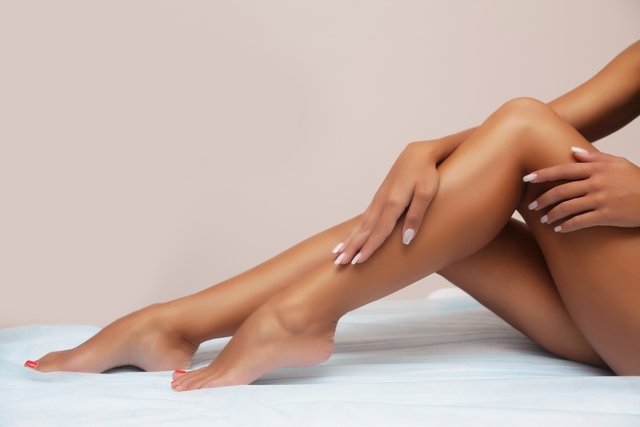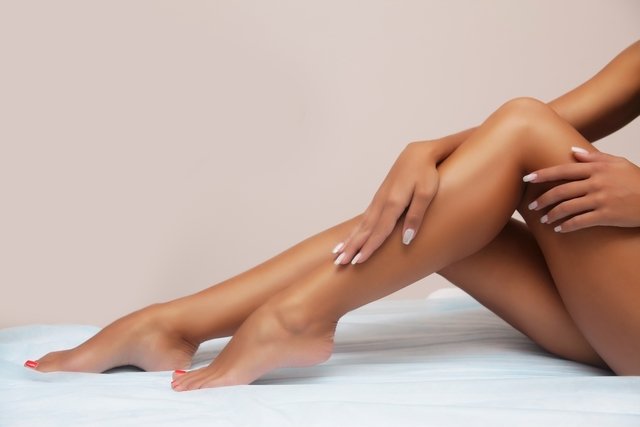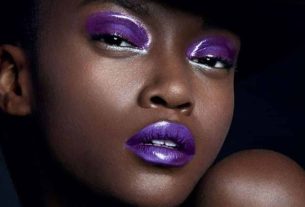Some tips for tanning without sunbathing include consuming supplements and foods rich in beta-carotene, for example. This is because beta-carotene stimulates the production of melanin, which is the pigment responsible for giving color to the skin.
Other options for tanning skin without the sun are using self-tanning creams or spray tanning, for example. However, it is important to use sunscreen regularly to prevent the appearance of blemishes on your skin.
People with allergies to the sun or people with Lupus, for example, should not expose themselves to the sun’s rays very frequently. In these cases, it is always recommended to consult a dermatologist to assess your health status and recommend the appropriate type of tanning.

How to tan your skin without sunbathing
Some tips for tanning your skin without sunbathing are:
1. Use self-tanner
Self-tanners can be found in the form of creams or sprays and are very effective for tanning your skin without going out in the sun. This is because they have dihydroxyacetone (DHA) in their composition, a substance that reacts with the amino acids present in the skin, stimulating melanoidin, a pigment that gives the skin a more tanned color.
However, to keep your skin with a uniform color, you must apply the cream using circular movements, in addition to using sunscreen, as this tanning does not protect against the sun’s ultraviolet rays, which can cause dark spots on the skin. See how to use self-tanner.
2. Tanning
Artificial tanning is an alternative to tanning your skin without having to sunbathe. This procedure is carried out in aesthetic or dermatological clinics, through spray tanning, where the professional, using a spray, applies the tanning product to the person’s skin. Learn more about spray tanning.
The product used in this procedure contains dihydroxyacetone, a substance that reacts with the skin’s keratin, resulting in a tan color. It is important that artificial tanning with a spray or jet is always recommended by a dermatologist, especially in the case of people who have a skin problem.
Furthermore, artificial tanning can also be done through tanning beds. However, in 2009, ANVISA banned the use of artificial tanning beds for aesthetic purposes, as it was proven that frequent artificial tanning favors the occurrence of skin cancer.
3. Eat foods rich in beta-carotene
Some foods, such as carrots, tomatoes, peppers and guava, contain beta-carotene, which are pigments that stimulate the production of melanin, favoring skin tanning. Check out other foods rich in beta-carotene.
Although they are great for tanning the skin, excessive consumption of foods rich in beta-carotene can make the skin more orange, which can be reversed by reducing or stopping consuming foods rich in this pigment.
4. Using tanning makeup
Some tanning makeup, such as bronzer and body makeup, are recommended to give a golden effect to the skin of the face or body.
Makeup is found in the form of creams or powder and can be applied by spreading the product, with a brush or fingertips, on the face and neck, or on the body.
5. Take beta-carotene supplements
Beta-carotene supplements, a pigment that acts in the formation of melanin, stimulate pigmentation and prolong the skin’s uniform tan.
These supplements may also contain vitamin C, selenium and copper, antioxidant nutrients that protect the skin against damage caused by sunlight, preventing skin aging.
Check out the video below for more tips for tanning your skin:

Sign up for our newsletter and stay up to date with exclusive news
that can transform your routine!
Warning: Undefined array key "title" in /home/storelat/public_html/wp-content/plugins/link-whisper-premium/templates/frontend/related-posts.php on line 12
Warning: Undefined array key "title_tag" in /home/storelat/public_html/wp-content/plugins/link-whisper-premium/templates/frontend/related-posts.php on line 13




